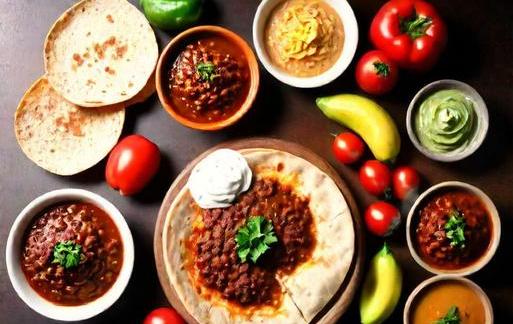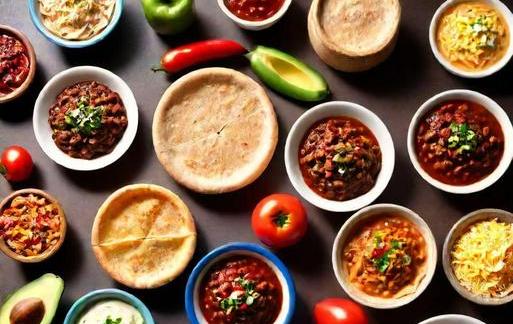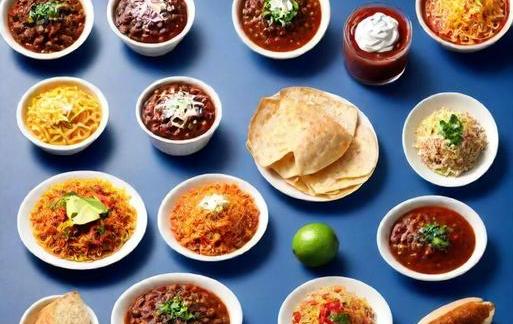- You are here:
- Home »
- Food
- » [REVEALED] Hispanic Foods That Start With D
[REVEALED] Hispanic Foods That Start With D
Note: This page contains affiliate links.
As an Amazon Associate, I earn from qualifying purchases when you click on the link, but you are not charged extra.
Hispanic cuisine is a vibrant tapestry of flavors, colors, and traditions that have captivated food enthusiasts around the world. In this gastronomic exploration, we delve into the rich realm of Hispanic foods that start with the letter “D”. From mouthwatering dishes to delightful desserts, this curated list showcases the diversity and culinary excellence inherent in Hispanic cooking. Prepare to embark on a journey through delectable delights that embody the essence of Hispanic culinary heritage.
Contents
List Of Hispanic Foods That Start With D

1. Dulce De Leche
Dulce de Leche, translated as "sweet milk," is a luscious caramel-like spread that originates from Latin America. Made by slowly simmering sweetened condensed milk, this velvety delight is a staple in Hispanic households. Whether drizzled over pancakes, spread on toast, or used as a filling for pastries, Dulce de Leche adds a touch of sweetness to any culinary creation.
2. Dorado (Fish)
Dorado, a term in Spanish for "golden," is a popular fish in Hispanic cuisine. Also known as Mahi-Mahi, it is prized for its firm texture and mild flavor. Commonly grilled or pan-seared, Dorado is often seasoned with a blend of traditional spices, showcasing the mastery of Hispanic culinary techniques. Served with a side of rice or paired with tropical fruit salsas, Dorado is a seafood sensation.
3. Dobladas
Dobladas, meaning "folded" in Spanish, are a savory delight that hails from Guatemala. These stuffed tortillas are folded over a filling of choice, which can include beans, cheese, or meats. Once filled, they are typically griddled until golden brown, creating a crispy exterior that encases a flavorful interior. Dobladas are often served with fresh salsa and guacamole, providing a symphony of textures and tastes.
4. Dulce De Batata
Dulce de Batata, or sweet potato candy, is a traditional Hispanic treat enjoyed in various Latin American countries. Made by slowly cooking sweet potatoes with sugar and spices, this confection boasts a unique combination of sweetness and earthiness. Often served in squares or rounds, Dulce de Batata is a nostalgic delight that captures the essence of homemade Hispanic sweets.
5. Dominican Arepas
Arepas, a versatile staple in Hispanic cuisine, take on a distinctive form in the Dominican Republic. Dominican Arepas are small, thick cornmeal patties, usually stuffed with cheese, ham, or a combination of both. These savory delights are then fried to golden perfection, creating a crispy exterior that contrasts with the gooey, cheesy interior. Often enjoyed as a snack or breakfast item, Dominican Arepas showcase the creative variations of this beloved dish across Hispanic cultures.
6. Dulce De Guayaba
Dulce de Guayaba, or guava candy, is a sweet treat that celebrates the tropical flavors of Hispanic regions. Made from ripe guavas, sugar, and sometimes lemon juice, this confection is cooked down to a thick, sticky consistency. Dulce de Guayaba is not only enjoyed on its own but is also a popular filling for pastries and desserts, adding a burst of fruity sweetness to every bite.
7. Diced Chayote Salad (Ensalada De Chayote)
Chayote, a versatile vegetable used in Hispanic cooking, takes center stage in this refreshing salad. Diced Chayote Salad, or Ensalada de Chayote, features the crisp and mild chayote paired with vibrant vegetables like tomatoes, onions, and bell peppers. Seasoned with lime juice, cilantro, and a dash of chili, this salad is a delightful side dish that complements a wide range of Hispanic main courses.
8. Dulce De Coco
Dulce de Coco, or coconut candy, is a sweet delicacy that showcases the tropical influence in Hispanic desserts. Grated coconut is combined with sugar and milk, then simmered until it reaches a fudge-like consistency. Often cut into squares or molded into bite-sized shapes, Dulce de Coco offers a chewy and decadent experience that captures the essence of coconut in every bite.
9. Dorado Tacos
Tacos are an iconic element of Hispanic cuisine, and the Dorado Tacos bring a unique twist to this beloved dish. Dorado Tacos feature the golden Mahi-Mahi, marinated and grilled to perfection, then nestled in corn or flour tortillas. Topped with fresh salsa, cabbage slaw, and a drizzle of tangy crema, these tacos showcase the fusion of flavors and textures that make Hispanic tacos a global sensation.
10. Dulce De Membrillo
Dulce de Membrillo, also known as quince paste, is a sweet delight that originates from Spain but has become a cherished part of Hispanic culinary traditions. Made from quince fruit, sugar, and lemon juice, this dense and jelly-like paste is often paired with cheese, creating a perfect balance of sweet and savory. Dulce de Membrillo adds a touch of sophistication to cheese platters and is a classic element in Hispanic dessert presentations.
This culinary journey through Hispanic foods that start with 'D' offers a glimpse into the rich and diverse tapestry of flavors that define Hispanic cuisine. From sweet indulgences like Dulce de Leche and Dulce de Coco to savory delights like Dobladas and Dorado Tacos, each dish tells a story of tradition, creativity, and a deep connection to the cultural roots of the Hispanic world. As you explore these delectable delights, you not only savor the tastes but also appreciate the craftsmanship and passion embedded in each recipe. Whether enjoyed as a part of a festive celebration or in the comfort of your home, Hispanic foods that start with 'D' are a testament to the culinary artistry that continues to captivate and inspire food enthusiasts worldwide. So, embrace the flavors, try out these recipes, and let the essence of Hispanic gastronomy enrich your culinary experiences.
Significance

Hispanic cuisine is a rich tapestry of flavors, colors, and traditions that reflect the diverse cultures of the Spanish-speaking world.
Understanding the significance of Hispanic foods that start with D requires a glimpse into the historical, cultural, and geographical aspects of the Hispanic world. The Spanish-speaking nations, spanning from Spain to Latin America, have a shared heritage that has shaped their culinary landscape. The significance lies not only in the taste but in the stories and traditions woven into each dish, symbolizing the identity and diversity of the Hispanic people.
Category-Related

1. Dulce De Leche: A Sweet Symphony From Latin America
Dulce de Leche, a luscious caramel-like concoction, is a beloved treat that originated in Latin America. Made by slowly simmering sweetened condensed milk, it achieves a rich, velvety texture with a complex flavor profile. This versatile delicacy finds its way into various desserts, from cakes and pastries to ice creams, adding a touch of sweetness that defines Latin American sweets.
2. Dobladas: The Folded Wonders Of Guatemala
Dobladas are a culinary gem hailing from Guatemala. These stuffed tortillas are folded and filled with a variety of ingredients, often including meats, cheeses, and vegetables. Grilled to perfection, the outer layer becomes crispy, creating a delightful contrast with the savory fillings. Served with salsa or guacamole, dobladas offer a savory experience that captivates the taste buds.
3. Dominican Mangu: Plantain Perfection
In the Dominican Republic, Mangu stands as a breakfast staple. This dish features mashed green plantains seasoned with onions, butter, and sometimes accompanied by fried cheese, salami, or eggs. Mangu exemplifies the art of transforming simple ingredients into a hearty and satisfying morning meal, showcasing the resourcefulness and creativity ingrained in Hispanic cuisine.
4. Dulce De Batata: Spain’s Sweet Potato Elegance
Spain contributes to this culinary exploration with Dulce de Batata, a sweet potato dessert. This confection involves simmering sweet potatoes with sugar and cinnamon until they reach a delightful candied consistency. Often served during holidays and special occasions, Dulce de Batata showcases the Spanish inclination for transforming humble ingredients into sophisticated and delightful treats.
Common Themes
The Hispanic foods that start with D share common themes that reveal the essence of Hispanic cuisine. These themes encompass the celebration of fresh, locally-sourced ingredients, the influence of indigenous flavors, and a passion for communal dining experiences.
1. Fresh And Locally-Sourced Ingredients
Central to Hispanic culinary traditions is the emphasis on fresh, locally-sourced ingredients. Whether it’s the vibrant tropical fruits in Latin America or the robust olive oils in Spain, the commitment to using what the land provides is a unifying thread. This connection to local flavors ensures an authentic and dynamic gastronomic experience that evolves with the seasons and regional variations.
2. Indigenous Influences
Hispanic cuisine is a beautiful mosaic of influences, with indigenous flavors playing a pivotal role. The incorporation of native ingredients, cooking techniques, and culinary practices adds depth and authenticity to dishes. From the use of corn in Central American tortillas to the reliance on root vegetables like sweet potatoes in Spain, these indigenous elements contribute to the unique and diverse tapestry of Hispanic cuisine.
3. Communal Dining Traditions
Food in Hispanic culture is not merely sustenance; it’s a shared experience that brings people together. Communal dining is a cherished tradition, with meals often serving as a focal point for social gatherings and celebrations. The preparation and enjoyment of food become a communal affair, fostering connections and strengthening bonds within families and communities.
Interesting Facts
Exploring the world of Hispanic foods that start with D unveils intriguing facts that add depth to the culinary narrative. These facts showcase the historical roots, cultural significance, and global impact of these delectable dishes.
1. Dulce De Leche’s Global Spread
While Dulce de Leche has its origins in Latin America, its popularity has transcended borders. This sweet delicacy has become a global sensation, finding its way into pastries, candies, and desserts worldwide. Argentina, in particular, has embraced Dulce de Leche as a cultural icon, with the average Argentine consuming an impressive amount of it each year.
2. Dobladas: A Culinary Fusion In Guatemala
Dobladas in Guatemala exemplify the fusion of indigenous and Spanish influences. The use of tortillas, a pre-Columbian staple, combined with the Spanish tradition of folding and stuffing, showcases the dynamic interplay of cultures that defines much of Hispanic cuisine. This blending of culinary heritages is a testament to the rich history embedded in every bite.
3. Dominican Mangu’s Resilience
The resilience of Mangu as a breakfast dish in the Dominican Republic reflects the adaptability and resourcefulness ingrained in Hispanic culinary traditions. Originally inspired by West African cuisine, Mangu has evolved over centuries, adapting to local ingredients and preferences. Its enduring popularity speaks to its ability to resonate with generations, making it a timeless and cherished dish.
4. Dulce De Batata: A Sweet Symphony In Spain’s Culinary Heritage
In Spain, Dulce de Batata holds a special place in culinary celebrations. This sweet potato delicacy has deep roots in Spanish history, with variations dating back to medieval times. Its enduring presence in festive occasions reflects the cultural significance attached to preserving and passing down traditional recipes through generations.
Conclusion
In the vast and diverse realm of Hispanic cuisine, the exploration of foods that start with the letter D offers a glimpse into the flavors, traditions, and stories that define this culinary tapestry. From the sweet indulgence of Dulce de Leche to the savory delights of Dobladas and Dominican Mangu, each dish encapsulates the essence of Hispanic culinary heritage.
As we savor the culinary delights presented in this article, we recognize that Hispanic cuisine is not just about the ingredients or the preparation; it’s a celebration of identity, resilience, and the vibrant tapestry of cultures that converge in each dish. So, whether you find yourself indulging in the sweetness of Dulce de Batata in Spain or relishing the folded wonders of Dobladas in Guatemala, you are partaking in a journey through history, tradition, and the heartwarming spirit of Hispanic gastronomy.


